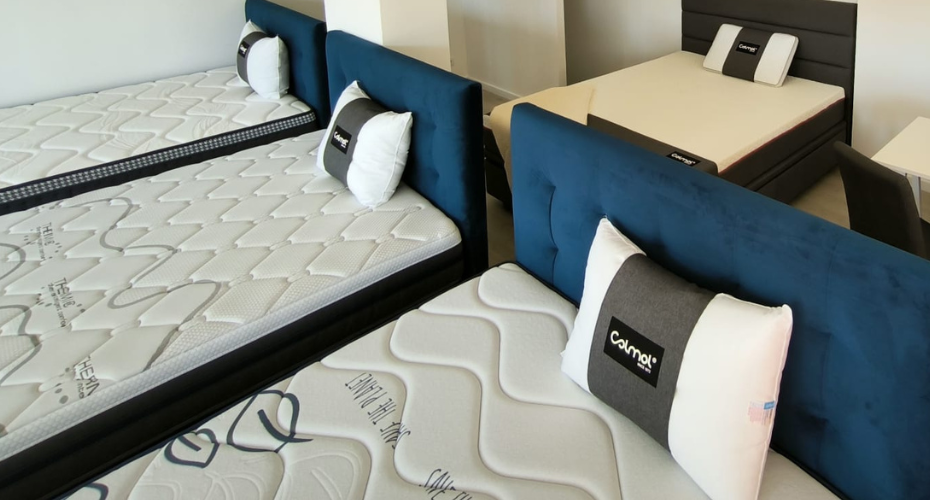To choose the mattress: density or hardness?
Index

One of the key elements to ensure a good night's rest is the mattress we choose to sleep on. However, with so many options available on the market, it can be challenging to decide which is best suited to our individual needs.
One of the most frequent questions when selecting a mattress is understanding which aspect we should pay more attention to: to the density or firmness?
Although they may seem similar, they are distinct concepts and each plays a crucial role in the comfort and support a mattress offers. But after all, what is the difference between the two? And how can they affect the quality of our sleep?
Density and Firmness: what are the differences?
The fundamental difference between density and firmness of a mattress lies in the nature of the material and the sensation the mattress provides to the person lying on it.
The density refers to the amount of viscoelastic material present in the mattress relative to the volume occupied. This measurement is expressed in kilograms per cubic meter (kg/m³) and indicates the amount of raw material used in mattress manufacturing. For example, in a mattress with density 28 (D28), we can conclude that it contains 28kg of raw material per cubic meter.
Density is also an indicator of product quality, especially regarding its resistance and durability. Generally, the higher the mattress density, the better its performance. Conversely, in terms of cost, a mattress with lower density has a more affordable price, as it contains less viscoelastic material.
Density is also directly related to the durability and support that the mattress offers to the body during sleep. Mattresses with higher density tend to be firmer and provide more consistent support, while mattresses with lower density can be softer and less firm.
On the other hand, the firmness - also known as firmness - refers to feeling of firmness or softness that the mattress provides when someone lies on it. However, this is a subjective measure and can vary from person to person, as it always depends on each individual's comfort preferences.
Choosing mattress firmness can have important health implications, especially for people with back problems or other medical conditions. Very firm mattresses can be uncomfortable for some people and may worsen back pain or muscle stiffness. On the other hand, very soft mattresses may not provide adequate support for the spine, which can also lead to discomfort and posture problems.
It is important to find a balance between comfort and support when choosing mattress firmness. Testing different firmness levels can help determine each person's personal preference. Additionally, consulting a health professional, such as a physiotherapist or orthopedist, can be helpful for obtaining specific guidance.
The ideal mattress density
Mattress density has a crucial impact on the quality of our sleep, as an inadequate density can result in discomfort, body aches, and even sleep disorders.
Mattress densities most used are D28, D33, and D45. However, the ideal density level will always depend on body weight, sleeping position, and personal preference. Some people prefer to sleep on a softer surface, while others need the support that a medium-firm mattress provides to avoid back pain.

It is important to remember that these density ranges are only examples, and that specific characteristics may vary depending on the manufacturer and the materials used in the mattress composition.
High-density mattresses
A high-density mattress distributes body weight more evenly, helping to maintain the aligned spine and reducing pressure on certain points, such as shoulders, hips, and knees.
Furthermore, this type of mattress offers firm and consistent support to the body, is generally more durable, and maintains its shape longer. However, they can be heavier and harder to move, and some people may find them too firm and uncomfortable.
High density mattresses have a more compact and sturdy structure, making them less prone to sagging or losing their shape over time.
Low density mattresses
On the other hand, the low density mattresses are generally softer and less hard/firm. Although they may be more comfortable for some people—especially those who prefer a softer feel when lying down—they may not guarantee adequate support for those suffering from back pain, for example. Additionally, they may lose their shape and support more quickly.
On the other hand, low density mattresses provide a softer and more comfortable feel, and are also lighter and easier to move.
Aspects to consider when choosing mattress density
Choosing the ideal mattress density is crucial to ensure adequate comfort and support during sleep.
It is always recommended to consult the specifications provided by the manufacturer to determine the exact density of the mattress and how it aligns with sleep preferences and individual needs.
Thus, for a conscious choice you should:
- Consider body weight. Heavier people tend to prefer higher density mattresses, as these offer firm and durable support. For lighter people, a lower density may be more comfortable;
- Assess comfort preferences. Do you prefer to sleep on a firmer or softer mattress? Higher density mattresses tend to be firmer, while lower density ones are generally softer;
- Consider health issues. For those with back or joint problems, a mattress with higher density may be preferable to provide adequate support and relieve pressure points;
- Test different options. Before making a purchase, it is important to test different mattresses in physical stores to help determine which density is most comfortable and suitable for each need;
Ideal density and firmness: Colmol tips for a conscious choice
At Colmol we offer a unique and personalized approach through our physical stores, where our Sleep Advisors are ready to help you find the best option.
Comfort test in showrooms
We invite you to visit one of the showrooms from Colmol to try the wide variety of mattresses available. Our Sleep Advisors are available to guide you through the selection process, offering valuable insights and personalized guidance.
You can try our mattresses and the different levels of density, firmness, and support to determine which is best for you.
Personalized consultation with sleep advisors
Colmol's sleep advisors are specialized professionals available to advise based on specific sleep and health needs. Based on your personal comfort and support preferences, they can recommend mattress options that best suit your individual needs.
Thanks to extensive experience and knowledge, Colmol's Sleep Advisors help ensure that your choice is informed and suitable when selecting your mattress.

At Colmol, our priority is the satisfaction of those seeking to improve their nights of rest through effective and quality products. Our team of Sleep Specialists provides daily personalized advice tailored to the needs of each client who seeks us.
If you are looking for this specialized help, you can contact us directly through::
- phone number +351 300 600 110
- or send us your questions to the email suporte@colmol.pt
